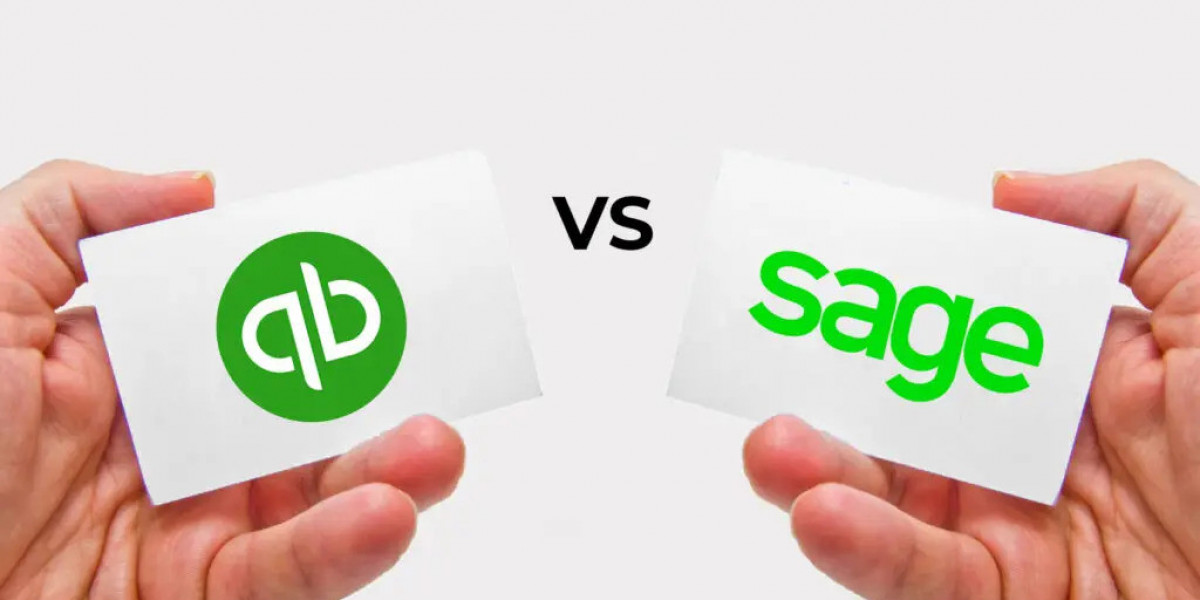Choosing the right accounting software is crucial for businesses of all sizes. Two popular options dominate the market: QuickBooks vs Sage. Both offer powerful features to streamline financial management. However, they differ in various aspects that can impact your decision. This article will compare QuickBooks and Sage in detail. We'll explore their features, pricing, ease of use, and more. By the end, you'll have a clear understanding of which solution suits your needs best.
Company Backgrounds
Intuit, a renowned software company, developed QuickBooks in 1983. Since then, it has become a household name in small business accounting. QuickBooks caters primarily to small and medium-sized enterprises (SMEs). It offers both cloud-based and desktop versions of its software. Over the years, QuickBooks has evolved to meet the changing needs of businesses. It now provides a range of features beyond basic accounting functions.
Sage Group, a British multinational enterprise software company, created Sage in 1981. Initially known as Sage Line 50, it has grown into a comprehensive accounting solution. Sage targets businesses of all sizes, from small startups to large corporations. Like QuickBooks, Sage offers both cloud-based and on-premises solutions. The company has expanded its product line to include various business management tools.
Features Comparison
1. Accounting and Bookkeeping: Both QuickBooks and Sage offer robust accounting and bookkeeping features. They allow users to track income and expenses, manage bank reconciliations, and generate financial reports. QuickBooks excels in its user-friendly interface and automated bank feeds. Sage, on the other hand, provides more advanced features for larger businesses. It offers better inventory management and multi-currency support.
2. Invoicing and Billing: QuickBooks and Sage both provide powerful invoicing and billing capabilities. Users can create professional invoices, set up recurring billing, and track payments. QuickBooks offers a wider range of customizable invoice templates. Sage, however, provides more advanced features for complex billing scenarios. It also offers better support for international transactions.
3. Payroll Management: Both software solutions offer integrated payroll management features. QuickBooks provides an easy-to-use payroll system with automatic tax calculations. Sage offers more comprehensive payroll features, including compliance with local regulations. It also provides better support for complex payroll structures in larger organizations.
4. Reporting and Analytics: QuickBooks and Sage both offer extensive reporting and analytics capabilities. Users can generate various financial reports and gain insights into their business performance. QuickBooks provides more visually appealing reports with customizable dashboards. Sage offers more advanced reporting features, including custom report builders and forecasting tools.
5. Inventory Management: Sage has a slight edge over QuickBooks in inventory management. It offers more advanced features for tracking stock levels and managing multiple warehouses. QuickBooks provides basic inventory tracking suitable for small businesses. However, it may fall short for businesses with complex inventory needs.
6. Integration Capabilities: Both QuickBooks and Sage offer integration with various third-party applications. QuickBooks has a larger ecosystem of add-ons and integrations. This makes it more versatile for businesses using multiple software solutions. Sage focuses on deeper integrations with enterprise-level systems. It's better suited for businesses with complex IT infrastructures.
User Interface and Ease of Use
QuickBooks is known for its intuitive and user-friendly interface. It features a clean design with easy-to-navigate menus and dashboards. The software uses simple language and provides helpful tooltips for beginners. QuickBooks offers a gentle learning curve, making it ideal for small business owners. It also provides excellent onboarding resources and tutorials for new users.
Sage's interface is more traditional and business-like compared to QuickBooks. It offers a comprehensive set of features but may seem overwhelming to new users. The software requires more accounting knowledge to navigate effectively. However, Sage provides extensive training resources and customer support. This helps users make the most of its powerful features.
Pricing Models
QuickBooks offers several pricing tiers to cater to different business needs. The pricing structure is based on the number of users and features required. QuickBooks Online starts at a lower price point compared to Sage. This makes it more accessible for small businesses and startups. The software also offers frequent discounts and promotions for new subscribers.
Sage's pricing model is more complex and varies based on the specific product. The company offers different solutions for different business sizes and industries. Sage tends to be more expensive than QuickBooks, especially for advanced features. However, it provides more flexible pricing options for larger organizations. Sage also offers customizable plans for businesses with specific needs.
Cloud-based vs Desktop Versions
QuickBooks offers both cloud-based and desktop versions of its software. QuickBooks Online is the more popular choice for modern businesses. It provides real-time access to financial data from anywhere with an internet connection. The desktop version, QuickBooks Desktop, offers more advanced features for specific industries. However, it lacks the flexibility and collaboration features of the online version.
Sage also provides both cloud-based and on-premises solutions. Sage Business Cloud Accounting is their primary cloud offering for small businesses. Sage 50cloud combines the power of desktop software with cloud connectivity. This hybrid approach appeals to businesses that need advanced features and cloud accessibility. Sage also offers enterprise-level cloud solutions for larger organizations.
Mobile App Functionality
QuickBooks offers a robust mobile app for both iOS and Android devices. The app allows users to perform various accounting tasks on the go. Users can create and send invoices, track expenses, and view financial reports. The QuickBooks mobile app syncs seamlessly with the desktop or online version. This ensures data consistency across all devices.
Sage also provides mobile apps for its accounting software. However, the functionality varies depending on the specific Sage product. Some Sage mobile apps offer basic features like expense tracking and invoice creation. Others provide more comprehensive functionality for larger businesses. Overall, QuickBooks has a slight edge in mobile app usability and features.
Customer Support and Resources
QuickBooks offers extensive customer support options for its users. These include phone support, live chat, and email assistance. The company also provides a comprehensive knowledge base and community forums. QuickBooks users can access video tutorials and webinars for self-paced learning. The software's popularity has led to a large ecosystem of third-party support resources.
Sage is known for its excellent customer support, especially for larger businesses. The company offers phone, email, and live chat support for its users. Sage also provides extensive online resources, including user guides and tutorials. The software comes with built-in help features and contextual assistance. Sage's support is particularly strong in addressing complex accounting issues.
Industry-specific Solutions
QuickBooks offers industry-specific versions of its software for certain sectors. These include construction, manufacturing, nonprofit, and retail industries. The industry-specific editions provide tailored features and reports for these sectors. However, QuickBooks' industry solutions are not as comprehensive as Sage's offerings.
Sage excels in providing industry-specific solutions for various sectors. The company offers specialized software for construction, real estate, manufacturing, and more. These solutions come with features tailored to the unique needs of each industry. Sage's industry-specific offerings are more robust and suitable for larger businesses.
Scalability
QuickBooks is highly scalable for small to medium-sized businesses. The software grows with your business, offering more features as you upgrade. However, QuickBooks may struggle to meet the needs of large enterprises. It's best suited for businesses with relatively simple accounting requirements.
Sage offers better scalability for growing businesses and large enterprises. The software provides a clear upgrade path as your business expands. Sage's enterprise-level solutions can handle complex accounting needs of big corporations. This makes it a more suitable choice for businesses with long-term growth plans.
Data Security and Compliance
QuickBooks takes data security seriously, employing various measures to protect user information. The software uses bank-level encryption for data transmission and storage. QuickBooks Online is compliant with major security standards like SOC 1 and SOC 2. The company regularly updates its security protocols to address emerging threats.
Sage also prioritizes data security and compliance in its software offerings. The company employs robust encryption and security measures to protect user data. Sage's enterprise solutions offer advanced security features for larger organizations. The software complies with various industry-specific regulations and data protection laws.
Customization and Flexibility
QuickBooks offers a good level of customization for small to medium-sized businesses. Users can customize reports, invoices, and dashboards to suit their needs. The software also allows for custom fields and tags to organize data. However, QuickBooks' customization options may be limited for businesses with unique requirements.
Sage provides more extensive customization options, especially in its higher-tier products. Users can tailor the software to match their specific business processes. Sage offers custom report builders and workflow automation tools. This flexibility makes Sage more suitable for businesses with complex accounting needs.
Collaboration and Multi-user Access
QuickBooks Online excels in collaboration features for small teams. It allows multiple users to access the system simultaneously. The software offers role-based permissions to control user access. QuickBooks also provides an accountant access feature for easy collaboration with professionals.
Sage offers robust collaboration features, especially in its enterprise-level solutions. The software supports large teams with complex organizational structures. Sage provides advanced user management and access control features. It also offers better support for companies with multiple departments or locations.
International Business Support
QuickBooks offers decent support for international businesses, especially in its online version. The software supports multiple currencies and can handle basic international transactions. However, its features for complex global operations are somewhat limited.
Sage provides better support for international businesses and multi-national corporations. The software offers advanced multi-currency and multi-language support. Sage also provides better compliance features for international tax regulations. This makes it a stronger choice for businesses operating in multiple countries.
Conclusion
Both QuickBooks and Sage offer powerful accounting solutions for businesses. QuickBooks excels in user-friendliness and is ideal for small to medium-sized businesses. It provides a gentle learning curve and a wide range of integrations. Sage, on the other hand, offers more advanced features and scalability. It's better suited for larger businesses with complex accounting needs.
Your choice between QuickBooks and Sage depends on your specific requirements. Consider factors like business size, industry, growth plans, and budget. QuickBooks is an excellent choice for small businesses seeking an easy-to-use solution. Sage is better for larger organizations that need advanced features and customization options.
Ultimately, both software solutions can significantly improve your financial management processes. Take advantage of free trials and demos to test each platform. This hands-on experience will help you make an informed decision. Remember, the right accounting software can streamline your operations and drive business growth.








